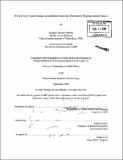| dc.contributor.advisor | Judith Tendler. | en_US |
| dc.contributor.author | Serrano Berthet, Rodrigo | en_US |
| dc.contributor.other | Massachusetts Institute of Technology. Dept. of Urban Studies and Planning. | en_US |
| dc.date.accessioned | 2006-09-28T15:14:00Z | |
| dc.date.available | 2006-09-28T15:14:00Z | |
| dc.date.copyright | 2005 | en_US |
| dc.date.issued | 2005 | en_US |
| dc.identifier.uri | http://hdl.handle.net/1721.1/34166 | |
| dc.description | Thesis (Ph. D.)--Massachusetts Institute of Technology, Dept. of Urban Studies and Planning, 2005. | en_US |
| dc.description | Includes bibliographical references (leaves 163-170). | en_US |
| dc.description.abstract | There is a consensus that citizen oversight, or the capacity of citizens to demand accountability, over government programs improves program performance. Yet little is known about the conditions that enable citizens/beneficiaries to demand accountability. This dissertation approaches this void in the literature by comparing two Community Driven Development (CDD) programs in Argentina and asking the question of why beneficiary oversight was higher in one program than in the other and why, within the same program, it was higher in some provinces than in others. The main conclusions are: (i) for beneficiary oversight to work at the project level (i.e., for beneficiaries to be able to control subcontracted providers of technical assistance) it was not sufficient to have accountability mechanisms at that level (in this case being able to hire and fire providers); (ii) due to asymmetries of technical knowledge and power between beneficiaries and providers, the former depended on the support of program staff willing to level out these asymmetries; (iii) given a highly politicized context, ensuring that program staff supported beneficiaries at the project level required having beneficiary oversight at the program governance level; in the program where this did not happen, patronage and clientelism took over the program, distorted its participatory nature and led to its collapse; | en_US |
| dc.description.abstract | (cont.) (iv) when beneficiary oversight took place at the program governance level it was due to (a) the program's commitment to support the consolidation of beneficiaries as a political actor capable of interacting with government, which expressed through (b) the creation of institutional mechanisms for program governance oversight that provided access to information about the program's performance, (c) the strengthening of supra-local networks at the national, provincial, and local level which increased beneficiaries' capacity for collective action and leverage; and (d) the construction of the program as part of the beneficiaries identity, which motivated them to mobilize to defend the program. (v) Intra program variation (across provinces) in beneficiary oversight was related to the capacity of state and civil society actors to resolve successfully the tensions involved in relations of critical collaboration (i.e., relations where actors need to collaborate with each other while remaining critical and vigilant of maintaining their autonomy). | en_US |
| dc.description.statementofresponsibility | by Rodrigo Serrano-Berthet. | en_US |
| dc.format.extent | 170 leaves | en_US |
| dc.format.extent | 11224507 bytes | |
| dc.format.extent | 11231654 bytes | |
| dc.format.mimetype | application/pdf | |
| dc.format.mimetype | application/pdf | |
| dc.language.iso | eng | en_US |
| dc.publisher | Massachusetts Institute of Technology | en_US |
| dc.rights | M.I.T. theses are protected by copyright. They may be viewed from this source for any purpose, but reproduction or distribution in any format is prohibited without written permission. See provided URL for inquiries about permission. | en_US |
| dc.rights.uri | http://dspace.mit.edu/handle/1721.1/7582 | |
| dc.subject | Urban Studies and Planning. | en_US |
| dc.title | Why do poor people demand accountability from some participatory programs and not others? | en_US |
| dc.type | Thesis | en_US |
| dc.description.degree | Ph.D. | en_US |
| dc.contributor.department | Massachusetts Institute of Technology. Department of Urban Studies and Planning | |
| dc.identifier.oclc | 69127104 | en_US |
